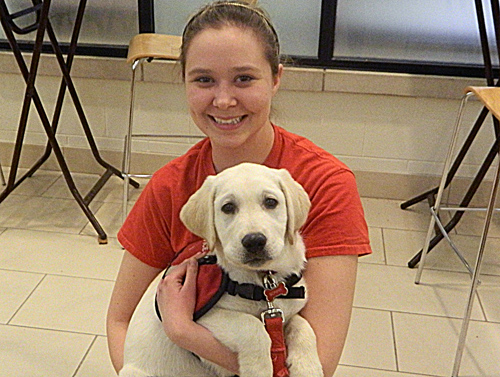
Sunny is a four-month-old yellow Labrador retriever with a cheerful personality and an obvious eagerness to learn. Right now he’s reluctantly obeying the order to lie down under the table in the OVC cafeteria. “He’s definitely smarter than the last puppy I had,” says Jordan Pelkmans, a third-year biomedical science student who is also a volunteer trainer with Autism Dog Services and brings Sunny with her when she’s on campus.
Her previous dog, Houston, was a “big, chubby chocolate Lab,” she says, and he started his advanced training earlier this year, where he’s doing well. Both dogs will ultimately – if all goes well – provide support to children with autism.
Autism Dog Services is one of three organizations providing service dogs for people with disabilities. Pelkmans, who has organized a Facebook group for students training service dog puppies, says last semester there were about six dogs from the Autism Dog Services, 15 from the National Service Dogs Association, and 16 from the Lions’ Foundation of Canada Dog Guides organization that visited campus regularly.
In response to the growing number of dogs in training on campus, as well as the presence of other dogs on campus that are not officially dogs in training, a new University policy has been put in place to regulate service animals at U of G.
All service animals in training must be registered with the Campus Community Police, and the handlers must provide on request documentation that they are from one of the three recognized organizations.
Only seven dogs from each group will be permitted on campus at any one time. The organizations will be responsible for limiting the number of trainers on campus.
In addition, the areas where the service animals in training are permitted to go have been defined in the policy. They are not permitted in food preparation areas, research laboratories, examinations, residences or the Child Care and Learning Centre.
Pelkmans says the registration of service dogs in training is something most of the trainers wanted. “It can be a problem for our dogs if there are a lot of pets in the buildings, as dogs in training get distracted by them.”
She’s also in agreement with the idea of limiting the number of service dogs in training on campus, as there is a potential for problems. “Sometimes you get six puppies in one class, and that can be a challenge.”
Pelkmans had hoped the limit would be higher, though. “It makes it harder for new students who would like to do this, as previous volunteers are given preference by the organization.”
She herself is hoping to train another puppy when Sunny is ready to move on, although she admits it’s not as easy as people imagine. “Yes, you get a cute and snuggly puppy, but it’s a lot of work. You have to go through housebreaking every time you get a new one, and that means pee on the floor, being woken up at 3 a.m. when they want to go out. I’m a full-time student and I have a part-time job, so adding in puppy training too is very tiring. Then just when you get them trained and everything is going well, they have to go.”
The trainers teach the puppies basic commands such as sit, down, stay, come and leave it. The biggest part of the job, though, is socializing the pups by taking them to a wide variety of places so they become comfortable in many different locations.
She discourages people from patting the puppies without asking the trainer first: “Sometimes they’ve just been misbehaving, and if you then pat the dog, you are reinforcing that inappropriate behaviour. So it helps a lot if you can just ask first.”
For Pelkmans, the work is worthwhile because she has seen the difference these dogs can make. “My mother is an educational assistant, and she worked with an autistic boy both before and after he got his service dog. The dog gave him much more independence because it could prevent him from wandering off into dangerous situations.”
Click here to read the full University of Guelph policy.